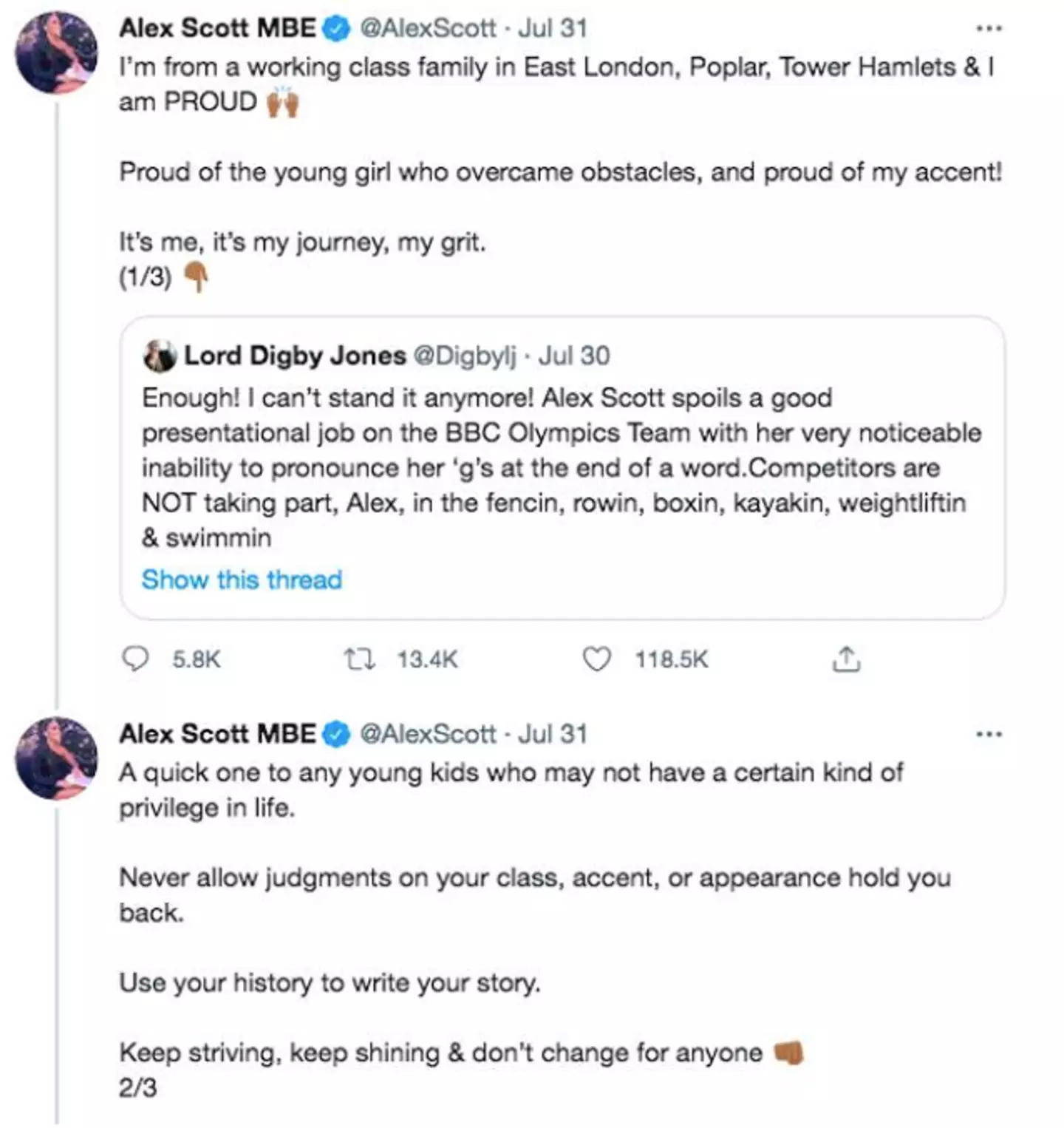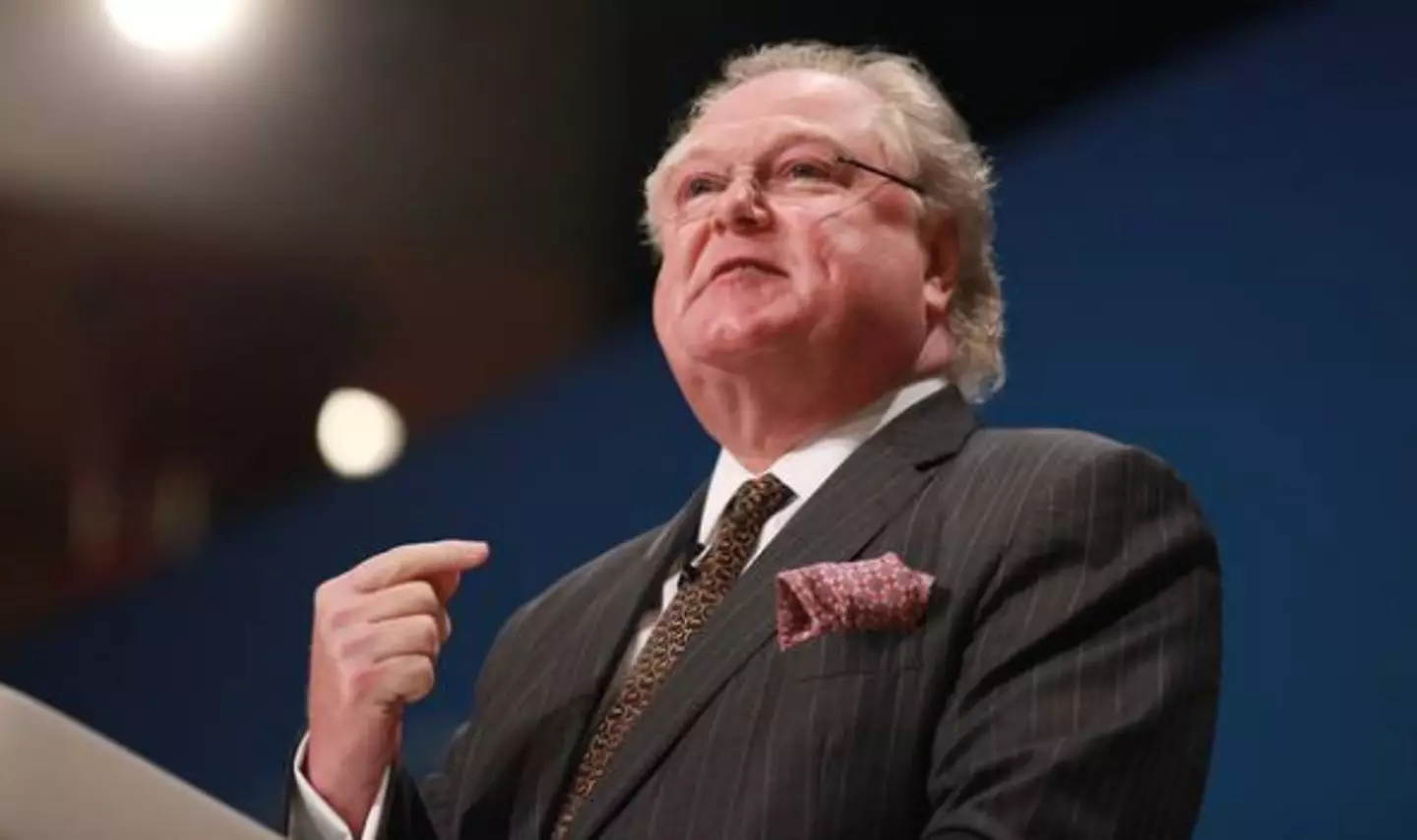
Footballer Alex Scott has been a breath of fresh air during the Tokyo Olympics coverage this year, offering not only insightful commentary but also humour, reliability and some much needed representation as she follows the sporting feats of Team GB for the BBC.
But, as we saw all too plainly last week, there's a depressing inevitability that comes with success as a working class woman of colour. With every positive stride for diversity, judgement follows.
As the Arsenal star, 36, introduced a live feed from the games last Friday, businessman and politician Lord Digby Jones, 65, criticised her so called lack of "elocution", tweeting that she "spoils a good presentational job on the BBC Olympics Team with her very noticeable inability to pronounce her Gs at the end of a word".
Advert
And while Alex managed to rise above his unnecessary outburst, the unashamed discernment behind his words struck a painful chord for many people from similar backgrounds, up and down the country.

One such individual is Sonya Barlow, a 28-year-old businesswoman, author and radio presenter from London. Having moved to the UK from Pakistan when she was four, Sonya grew up in a West London council estate, went to the worst school in the borough, and knows the prejudice that Alex recently faced all too well.
Sonya tells Tyla that, even as a child, she was so aware of the fact she sounded 'working class' that she endeavoured to change the way she spoke.
Advert
"I knew that I had to fix my accent and speak a certain way to get heard before I knew about basic women's stuff," she says. "It's funny because the people around me would be like ‘oh you’re trying to be posh’, but I didn't care, because I was already aware of the disadvantage I had.
"I guess I was also aware that when you heard people on the radio, they always spoke really well".
.jpg)
Having founded tech, digital and entrepreneurship mentorship charity, Like Minded Females - one of the largest social enterprises in the UK - and set up her own diversity and inclusion consultancy business, too, there's no denying that, like football captain Alex, Sonya is a driven, hardworking and impressive individual.
Advert
But she claims she's had to work twice as hard just to prove it, because of unfounded perceptions people make about her when she opens her mouth.
"When I was in my first placement internship, which was about six years ago, I was working with a small start up company that had about 15 middle class white folk, and they were like 'we're gonna go play a team bonding game...you’re the new person, so go and buy this money box'," she recalls.
"So, I went and bought a really cute money box, thought 'this is fun', and then my line manager explained: 'Every time you mispronounce something or speak a word of slang, you’re gonna have to put a pound in here’."
Looking back on that time, Sonya says the 'game' was just the tip of the iceberg. Not only did her colleagues repeatedly make fun of how she said certain words, but they even suggested she shouldn't attend client meetings because she didn't speak like them.

"I was just out of university, it was my first job and I didn't really know how the world worked," she says. "So, it didn't quite hit me that it was wrong."
Advert
It's only with hindsight that she realises these individuals were trying to shame her for not fitting into their white, privileged mould - and she makes no bones about the impact this treatment has had on her, to this day.
"There are certain words now that I still won’t pronounce because of how someone made fun of them five years ago," she says. "It didn't come from a place of wanting to help me. It was like, ‘you're lesser than us because you don’t know how to speak like us'."
Lord Digby Jones was accused of making similar assertions about Alex Scott when he publicly called out her delivery last week, to which the she defiantly responded: "I’m from a working class family in East London, Poplar, Tower Hamlets & I am PROUD.

"Proud of the young girl who overcame obstacles, and proud of my accent! It’s me, it’s my journey, my grit.
Advert
"A quick one to any young kids who may not have a certain kind of privilege in life.
"Never allow judgments on your class, accent, or appearance hold you back."
The football champ received a flurry of support from the public, as well as the likes of Labour MP's Dawn Butler and Jess Phillips, following the ordeal.
But working with big companies to improve diversity and inclusion today, Sonya knows for certain that it isn't just a few individuals carrying this internalised bias, and an inclination to 'correct' the way people speak.
When she conducted a poll on Linkedin asking: 'Have you ever been made to feel insecure because of your accent?', 65 per cent of respondents said they had.
And she's even had to explain to her own clients why they shouldn't write off colleagues that sound stereotypically 'working class' and 'unpolished'.
"Fundamentally, whats the first thing you do when you hire someone? You judge them on how they look and how they sound...
"And if someone doesn’t sound like you - for example they don’t pronounce the end of their words - people think ‘oh, they mustn’t read well’, or 'they haven't been schooled well', or 'they come from a certain area'," she says.
"These assumptions about personality which are tied to accents and dialects end up being held against people".
In reply to the backlash he received, boarding school-educated Lord Digby Jones protested: "Not sounding a G at the end of a word is wrong; period. It's not a question of class, it's not a question of accent, it's a question of poor elocution."
But was there really a need for him to say anything at all? And can you really ignore the classist undertones at play?
"The problem is that it negatively impacts working class women of colour that they are judged on their accent whist interviewing," Sonya explains. "We pride ourselves in the UK for being diverse and having different intersectional identities that have come together, and we should be talking about the ways we're succeeding in doing this, not someone's perceived failure."

Then there's the impact such outspoken criticisms have on those who are young or impressionable...
"They’re looking at this thinking, 'okay, great, so I need to learn how to pronounce everything correctly or I’m not going to get an opportunity'.
"Representation makes a big difference [when it comes to people] accepting their own identity."
When asked what must change, diversity coach Sonya states that, plainly, we need to be more inclusive of "the common man", and accept the fact that more of the population relate to someone like Alex Scott than they do to Lord Digby Jones.
"I think, really simply, it’s about education - and that doesn’t mean teaching how to speak, but bringing in a diversity of speakers that look and sound different, so that young people know they can still make it," she says.
"It’s about making sure at a senior executive level - or a Lord level, for example - you have diversity and representation where it matters.
"And it's about having social etiquette online and encouraging a community of celebration rather than trying to break people down."
We think Lord Digby Jones could do well to take note.
Featured Image Credit: PA/ Interviewee's Own